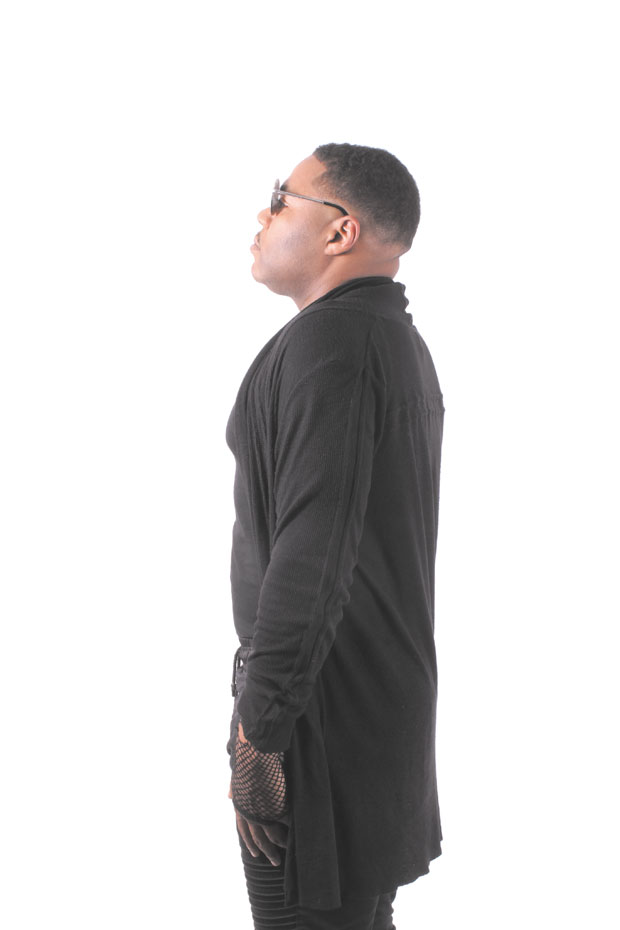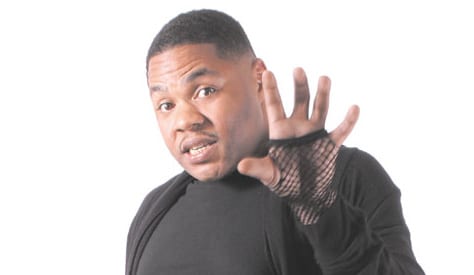Dezman Lehman’s road from closeted Pentecostal church kid to out-and-proud pop singer Dezi 5

Dezi 5 (aka Dezman Lehman) won Best Live Act from the Dallas Observer, validating his long journey from church misfit to legit musical artist. (Photos;Arnold Wayne Jones)
ARNOLD WAYNE JONES | Executive Editor jones@dallasvoice.com
Imagine growing up surrounded by music, but unable to embrace it. Now imagine the same thing, only with your sexual orientation. That’s the background Dezman Lehman faced. Although not reared by his mother, she “was still in my life” and the first gifts of music she gave Lehman were CDs of Mary J. Blige and Toni Braxton … not that he could listen to them.
“I grew up with my grandmother and it was all gospel,” he says. Lehman had to listen to his beloved R&B in secret, if at all; for a while, he sang at church, but his voice changed and “I was very shy about it. So I joined the band and played the clarinet.” You can’t play a woodwind and sing, so that seemed cut off for him. Similarly, he felt removed from his sexuality.
“For a long time, I’d been wanting to be a singer but was afraid to be one because [I thought], ‘No one wants a gay singer.’ There weren’t any to look up to in any pocket of where I grew up. I felt I couldn’t sing anymore.” But sing he does. Earlier this month, Lehman — known professionally as Dezi 5 — won Best Live Act at the 28th annual Dallas Observer Music Awards, finally authenticating a long journey of self-discovery. And therein lies a tale….
As a kid in South Dallas, Lehman felt early on that he didn’t fit in. His grandma encouraged him to play the piano, but balked at allowing pop music played in her house.
“I was in the closet about being a funk fan … but also about my sexuality,” he jokes. “I had a coming out as a singer [before coming out at gay]!”
Being gay was definitely not an option, either.
“I grew up as a black gay man in a Pentecostal church where a minister talked about gay men as fags,” he says. “I was worried that I would be judged as ‘this gay guy.’” (He was even the subject of a gay-conversion-esque intervention “because they ‘found a demon in me.’”)
His flamboyance has always made it difficult for him to hide his light under a bushel. One time, he recalls, his grandmother let him go shopping for whatever he wanted. He bought what he thought was “a cute silk shirt, but everyone laughed at me.” In high school, “all of my friends would be making out in the living room and I’d be in the bathroom singing to the soundtrack of Lady Sings the Blues.”
College opened his eyes to more possibilities. He was awarded a partial music scholarship to Florida A&M to play clarinet, but “being a music major, I still had to take fundamentals of voice. And my voice teacher told me, ‘You can fucking sing!’”
Music ended up being a key that unlocked several doors. After college, Lehman moved back to Dallas but “knew that there was something missing from my life,” Lehman says. “But when I embraced my orientation, I realized: It just takes power do so whatever you want to do.”
He set about forging his future, rather than letting it tick by. He put together a jazz band that would play neo-soul (Jill Scott, Chaka Khan) at Brooklyn; he then got a gig at a now-shuttered venue called Pearl at Commerce, singing Sinatra and The Great American Songbook. But his accompanist dropped out, and he couldn’t get a gig without live music. He decided it was time to reinvent himself, first by adopting the name Dezi 5.
“I found out about this from Erykah Badu — that the No. 5 means power,” he says, “and I needed that power to give it that oomph.”
Dezi 5 was originally a solo act, though he would bring a variety of set musicians into the mix and created his version of psychedelic rock inspired by Jim Morrison, Jimi Hendrix and the like. But his ultimate aim “was to integrate my music scene with the LGBT scene.”
At age 26, Lehman renounced his Christianity and determined to “crucify my insecurities. [After that], I was born again with this new sense of spirituality and art and life and humanity and the music of the universe,” he says.
He’s committed to unifying his love of artistry in all forms with his passion for music … and like any gay man, he has Lady Gaga and Madonna to thank for it.
“I watched an interview with Madonna and she said that in the 1980s the artist could not flourish without the musician and the musician could not flourish without the artist,” he recalls. And while he came to Gaga late (he didn’t learn about her until Born This Way, he admits), he was impressed by her devotion to both fashion and music. “She is so free about who she is — that was a call I had to listen to.”
Lehman has imparted this philosophy to the Deep Ellum scene, and “they ate it up,” he says. (The award — plus four other nominations — supports that conclusion.) But it’s a disappointment to him that he hasn’t made the same impact in the gayborhood.

“I performed at Alexandre’s at Halloween last year — my debut on Cedar Springs,” he says. “It was a good gig — I did pop tunes, David Bowie, my thing. But I got on top of the bar and those girls were like, ‘We don’t want your feet where we drink!’” he laughs.
He loves pop and dance music, but says, because he’s black, “they think I’m gonna be singing hip-hop or R&B. But all I really want is to be known as a Dallas artist, and make timeless music. You want things to last. And I stand out like a motherfucker.”
Finally, he’s at a place where he’s comfortable being that. All artists have to be themselves — it’s really all they have.
This article appeared in the Dallas Voice print edition December 23, 2016.












